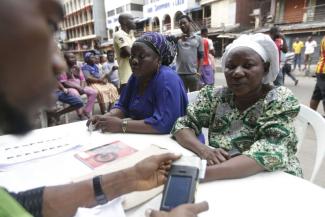Identification technology
Permanent voter cards prevent election fraud

Until recently, elections in Nigeria were characterised by violence and fraud. Powerful politicians hired thugs to snatch empty ballot boxes, which were then stuffed with marked ballot papers in private houses. Instead of cancelling the snatched boxes, corrupted electoral officials made sure they were part of the final collation and contributed to the results.
The 2003 and 2007 elections were most recent examples for this practice. The latter is regarded the worst election in the nation’s history. Voter apathy was becoming a major issue: voters lost interest in elections since they felt their votes were likely not to matter. There was an urgent need to infuse some confidence in the electoral system.
In mid 2014, it became known that the Independent National Electoral Commission (INEC), Nigeria’s electoral authority, was planning to introduce permanent voter cards (PVCs) and electronic card readers in the 2015 general elections.
The PVC contains its holder’s data, including biometric data such as fingerprints. The card reader reads the PVC’s embedded chip using cryptographic technology and displays the voter’s data. Then, the fingerprint of the voter is taken to see if it matches the one on the card.
The total number of accredited voters per card reader is forwarded to INEC using a communication key on the reader. Thus, INEC assured that cloned PVCs – which would have been necessary to rig elections – would be detected. Each reader is programmed for a specific polling unit, meaning the PVCs cannot be used in multiple polling units. Therefore multiple voting, which is also key in rigging, is almost impossible.
The electoral authority insisted that only voters with PVCs would be allowed to vote, as the former temporary voter’s card, which was actually a simple piece of paper, could be easily used for vote manipulation.
Opposition from politicians
While most Nigerians welcomed the new system with its promises of transparency and credibility, there was massive opposition from politicians. Some of them argued that the country was not ready for such technology. Others said that such innovation needed to be backed by legislation. The then ruling Peoples’ Democratic Party (PDP) vehemently opposed the use of the PVCs, warning that eligible voters risked being disenfranchised if the card readers failed. Some politicians even went to court to stop the introduction of the new system and force INEC to continue with the old way of manual voter accreditation.
INEC tried to allay all fears. It promised to provide back-up readers for cases of technical failure and to allow manual admission of voters who hold PVCs but cannot be authenticated by the card reader. Such voters would however need to fill what INEC calls an incidence form.
The then-opposition All Progressives Congress (APC) backed the use of the PVCs and card readers. Lai Mohammed, its publicity secretary who now serves as information minister, said the PDP opposed the innovation because it is regarded as the nemesis of those who have no interest in free and fair elections. “Only dishonest politicians, those who plan to rig, those who have engaged in a massive purchase of PVCs and those who have something to hide are opposed to the use of the machine. For the avoidance of doubt, our party is ready for any tool, including the card reader, that will ensure the votes of Nigerians will count in the election,” he said.
Ahead of the general elections on 28 March 2015, INEC – backed by civil society organisations – urged voters with an awareness campaign to get their PVCs. INEC also conducted tests of the card readers in twelve of the 36 states of the country to demonstrate the processes and workability. Some hitches were recorded during the test run, which the electoral authority promised to address in time.
President not recognised
On election day, the biggest malfunction of the card reader was when it failed to recognise the fingerprints of President Goodluck Jonathan and his wife at their polling station in his hometown. After several tries, the responsible electoral officer resorted to manual admission of the couple. Furthermore, the media reported malfunctioning of card readers in several other polling stations across the country. The identification of voters and thus the voting process in these areas were delayed. Elections had to be extended to the next day in the affected polling stations.
Largely though, the card readers reportedly worked satisfactorily. Local as well as international observers generally agreed that the new system helped to curb electoral fraud. It was also used two weeks later in the governorship and houses of assembly elections.
There is no doubt that the use of the PVCs and card readers helped make the 2015 elections a momentous victory for the country in its effort to strengthen and consolidate democracy. For the first time, an incumbent president lost re-election in Nigeria. The opposition candidate, Muhammadu Buhari, now rules the country.
The system still has to overcome some hurdles, though. The Supreme Court – in judgements regarding elections of state governors – recently ruled that the card readers cannot supersede the voters’ register until the national assembly amends the electoral act, giving the readers statutory backing.
However, Nigerians largely appreciated INEC’s introduction of digital technology. The PVC is now accepted as a means of identification in banks and businesses for instance. Even the national identity management commission cites the PVC in its bid to produce national identification cards for all Nigerians – a project which has suffered years of bureaucratic delays..
Damilola Oyedele is a senior correspondent for Thisday, a Nigerian newspaper. She lives in Abuja.
damiski22@yahoo.com







